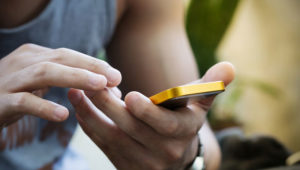 I have a lot of pet peeves when it comes to athletes when they’re training including standing around before drills (no intensity), chatting it up with teammates when they’re about to begin practice (no focus), and half-hearted effort at the beginning of workouts (competitions can be lost in the few minutes). But I now have added a new pet peeve that has quickly risen to the top of my list, namely, athletes having their phones with them and checking their social media during practice and at competitions.
I have a lot of pet peeves when it comes to athletes when they’re training including standing around before drills (no intensity), chatting it up with teammates when they’re about to begin practice (no focus), and half-hearted effort at the beginning of workouts (competitions can be lost in the few minutes). But I now have added a new pet peeve that has quickly risen to the top of my list, namely, athletes having their phones with them and checking their social media during practice and at competitions.
This pet peeve extends far beyond the training and competitive settings in which athletes perform and into their daily lives. The last generation or two (those who grew up after the iPhone was invented) have become addicted to social media including Facebook, Twitter, Instagram, Snapchat, texting, and others. When I use the word “addicted”, I mean literally so; research has demonstrated that social media has the same neurochemical effect on the brain as drugs, alcohol, and gambling.
A broader discussion of the role of technology in human development is beyond the scope of this article, but there are some real implications of media overuse and misuse on the lives and development of athletes and that is what I’m going to explore here.
Let’s return to my newest pet peeve, namely, the apparent inability of most young athletes to disconnect from their phones, even during practice. So, you may wonder, how is this incessant use of media impacting athletes?
The biggest area in which athletes are finding more and more difficulty is in the simple act of focusing. Considerable research has found that the attention spans of young people have decreased since the rise of smartphones and social media. Because of the distractions caused by the constant pinging, buzzing, and vibrating of social media notifications, not to mention the FOMO (Fear of Missing Out) effect, young people are losing the ability to stay focused for extended periods. The result has been a decline in study habits, learning, and grades.
This problem is no less evident and no less of a problem in sports. Many coaches in recent years have told me that their athletes are far less able to focus compared to previous generations. The consensus is that athletes in general these days are less able to pay attention to their coaches’ instructions, remember the feedback, and stay focused throughout a practice session.
One of the most common reasons young athletes come to me is because they say they have trouble focusing on what they’re working on in practice and they make mistakes in competitions because they lose focus. And in recent years, I have also found that young athletes have a much more difficult time staying focus during imagery sessions I conduct with them. Many tell me that their minds drift off quickly (often to what might be happening in cyberspace) and they’re not able to maintain or regain their focus on their sports imagery easily.
Why is focus so important in sports? Well, the ability to focus is the foundation of so many things related to consistent athletic performance. Focus impacts learning; without the capacity for sustained focus, athletes will forget what they are working on technically or tactically during practice. As soon as athletes lose focus, they stop doing whatever they were working on and further ingrain old and bad skills and habits. And, without that extended focus, they won’t be able to gain enough quality repetition necessary to effectively ingrain new skills and habits.
Focus plays a big role on the day of a competition as well. First, focus is important for pre-competitive strategy. Your ability to focus influences your memory of your game plan. Focus is also important during the competition. Without consistent focus from beginning to end, whether on technique, tactics, or just performing your best, you have little chance to perform up to your fullest ability.
Now, I can’t realistically get athletes to set limits on media use away from their sport. At the same time, I would like to make some reasonable suggestions that athletes, coaches, and sports programs can implement to at least keep the tech monster at bay while athletes are practicing and competing.
First, a few thoughts for athletes. Away from your sport, a consistent program of mental imagery is one of the best antidotes to the loss of focus due to excessive media use. When you do imagery, you are, by its very nature, requiring yourself to focus, thereby exercising your focus muscle and training it to focus from the start to the finish of your imagined performances.
I do understand that many of you use your smartphone as a mental tool on game day, mainly by listening to music to help you stay positive, adjust your intensity, establish a good mindset, and to create healthy distractions that keep you from thinking too much about the upcoming competition. I totally support that. But when it comes to practice, do you really need to listen to music during breaks? Do you really need to be checking your social media while resting? I would encourage you to ask yourself what will and will not help you to stay focused in practice and consider leaving your phone in your gear bag when you head out for practice.
Second, for coaches. You should have a conversation with your athletes in which you educate them about the importance of focus and talk to them about how media during practice and competitions can help or hurt their preparations and performances. See if you can come to some consensus on how, when, and where they use their media that will actually help them to perform their best.
Third, for programs. At the club, team, or academy level, I would recommend that you assemble a committee of coaches, parents, and athletes to create some guidelines that can help shape the culture of media use in your program. These guidelines will act as the norms and defaults for media use, so athletes will be more likely to adhere to them.
As we all know, sports can involve minute differences between winning and losing. Any advantage you can gain that will enable you to perform just a little bit better can make a big difference at the end of a day of competition. One simple, yet powerful, advantage you can gain is to be able to focus effectively in practice and to be totally focused from start to finish in competitions. A key tool you can use to improve your focus is, in my humble opinion, to turn your phone off during practice and use it only as a tool, rather than a toy, on game day.
Want to learn more about how to be mentally prepared to perform your best consistently? Get a copy of my Prime Sport e-book or register for my Prime Sport 101: Train Your Mind like a Champion online mental training course.



